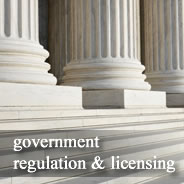The Defense of Act 13 Continues: Robinson Township Update.
On January 2, 2014 the Pennsylvania Public Utility Commission and Department of Environmental Protection (“Applicants”) filed an Application for Reargument of Robinson Township,1 in the Pennsylvania Supreme Court, requesting reconsideration of the December 19, 2013 plurality opinion and remand to the Commonwealth Court for an evidentiary hearing and findings of fact. The Applicants argue that the plurality of the Court, in applying its newly coined Environmental Rights Amendment balancing test, adopted novel and unsupported findings of fact, contrary to established Supreme Court principle against taking on a fact finding role in its appellate jurisdiction. Robinson Township, et al., (“Townships”) answer that no disputed facts were necessary to the Court’s balancing test, and in the alternative, judicial estoppel precludes Applicants from requesting an evidentiary hearing because Applicants successfully argued in the Commonwealth Court that the Act’s constitutionality was purely a question of law. Applicants also request remand to have the Commonwealth Court determine whether the unconstitutional set back provisions are severable from the rest of Act 13.
Applications for reargument/reconsideration are rarely filed and even more rarely granted.2 In the meantime, commentators speculate on the effects of the Robinson Township decision on the oil and gas industry in Pennsylvania. Michael L. Krancer and Margaret Anne Hill state that while the only winners from the decision are officials of the victorious townships, the Court’s decision will not put an end to the oil and gas industry in Pennsylvania. Another Legal Intelligencer article surmises even the townships may end up losers if on remand the Commonwealth Court decides Act 13’s impact fees are not severable from the unconstitutional portions of the Act or that the Act cannot stand as a whole without the unconstitutional provisions, thus likewise stripping townships of the impact fees.
Finally, it remains to be seen exactly what steps the Corbett administration is taking to fulfill the Governor’s statement that he will “continue to work with members of the House and Senate to ensure that Pennsylvania’s thriving energy industry grows and provides jobs while balancing the interests of local communities.”
Stay tuned to the HMS blog for further updates on Act 13, Robinson Township, its effects on the industry, and subsequent administrative, legislative, and executive actions.![]()
1 Robinson Township v. Com., 2013 WL 6687290 (Pa. 2013).
2 Darlington, McKeon, Shuckers, and Brown, Pennsylvania Appellate Practice, § 2543:7 p. 819 (West 2013).
By accepting you will be accessing a service provided by a third-party external to https://www.hmslegal.com/







